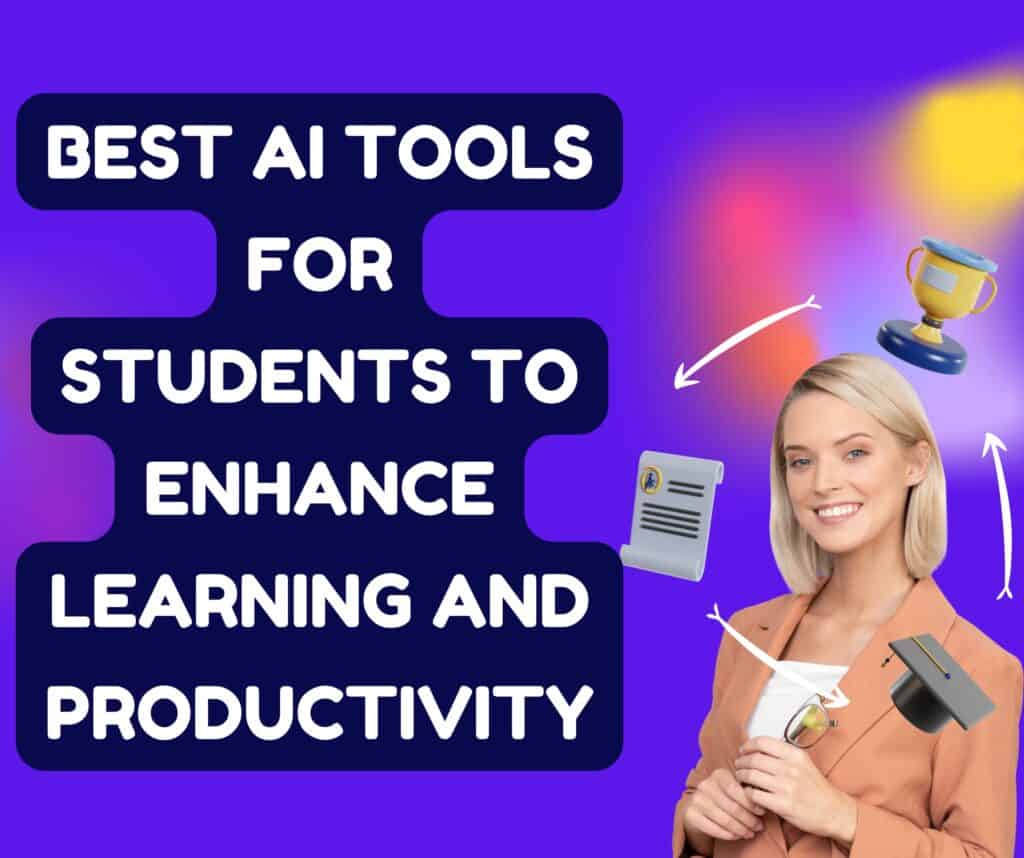In today’s rapidly evolving educational landscape, artificial intelligence (AI) is playing an increasingly significant role in transforming how students learn and manage their academic responsibilities. From personalized tutoring to intelligent study aids, AI tools are designed to enhance the learning experience by providing tailored support and streamlining various aspects of student life.
How AI Tools are Transforming Student Life
AI technology has revolutionized the way students approach their studies by offering innovative solutions that cater to individual learning needs and preferences. For example, AI-powered note-taking apps can automatically organize and categorize lecture notes, making it easier for students to access and review important information. Similarly, AI-driven tutoring platforms provide personalized feedback and guidance, helping students grasp complex concepts and improve their academic performance.
Moreover, AI tools are not limited to academic support; they also play a crucial role in helping students manage their time and workload effectively. Intelligent task management apps can prioritize assignments and set reminders based on deadlines and personal study habits, ensuring that students stay on track and avoid last-minute cramming.
Importance of Leveraging Technology for Academic Success
Leveraging AI tools in education is more than just a trend—it’s becoming an essential component of academic success. By integrating these advanced technologies into their daily routines, students can benefit from enhanced learning efficiency, better organization, and improved productivity. AI tools can provide valuable insights into learning patterns and offer actionable recommendations for improvement, allowing students to focus on areas where they need the most support.
In a competitive academic environment, the ability to utilize technology effectively can give students a significant edge. Embracing AI tools not only aids in achieving better grades but also prepares students for a future where technological proficiency will be increasingly important in their careers and personal lives. By adopting these tools, students can navigate their academic journey with greater ease and confidence, ultimately leading to a more successful and fulfilling educational experience.
Affiliate Disclosure: This post contains affiliate links, and I may earn a commission if you purchase through them. However, these links offer valuable resources to help you build a profitable online business.
Try Wealthy Affiliate (For Free).
Top AI Tools for Studying
As students strive to maximize their study efficiency and enhance their learning experiences, AI tools offer valuable support in various areas. From organizing notes to providing personalized tutoring, these tools are designed to cater to diverse learning needs and preferences. Here’s a closer look at some of the top AI tools that can significantly improve your study routine.
AI-Powered Note-Taking Apps
Effective note-taking is a cornerstone of successful studying, and AI-powered apps have revolutionized this process by making it more efficient and organized. Here are two standout options:
- Evernote: Known for its robust organizational features, Evernote uses AI to help students manage and retrieve their notes with ease. The app’s intelligent search capabilities allow users to quickly find specific information by recognizing keywords and phrases within their notes. Additionally, Evernote’s AI-driven organization tools automatically categorize and tag notes based on their content, making it easier to keep track of different subjects and topics. This ensures that students spend less time searching for information and more time focusing on their studies.
- Microsoft OneNote: Microsoft OneNote enhances note-taking with its intelligent transcription and search functionalities. The app’s AI algorithms can transcribe handwritten notes into digital text, allowing students to access and edit their notes more efficiently. OneNote’s powerful search engine can also recognize and search through handwritten notes and images, providing quick access to important information. This feature is particularly useful for students who prefer taking handwritten notes but want the convenience of digital accessibility.
AI Tutoring and Study Assistance
Personalized tutoring and study assistance are essential for addressing individual learning needs. AI-powered platforms provide tailored support and interactive learning experiences that can boost student performance. Here are two notable examples:
- Khan Academy’s Khanmigo: Khan Academy’s Khanmigo is an AI-driven tutoring tool designed to offer personalized learning experiences. Khanmigo provides students with interactive lessons, quizzes, and feedback based on their performance and progress. By analyzing students’ strengths and weaknesses, Khanmigo adjusts the difficulty of questions and offers targeted practice to help improve understanding in specific areas. This personalized approach ensures that students receive the support they need to excel in their studies.
- Socratic by Google: Socratic is an AI-based app that assists students with homework and explanations in various subjects. By using image recognition and natural language processing, Socratic can analyze questions and problems posed by students and provide step-by-step explanations and solutions. The app also offers additional resources such as video tutorials and relevant articles to help students grasp challenging concepts. Socratic’s ability to deliver instant, contextually relevant assistance makes it an invaluable tool for tackling difficult assignments and enhancing comprehension.
AI Tools for Writing and Research
Writing and research are fundamental components of academic success, and AI tools are increasingly becoming essential for students to produce high-quality work efficiently. These tools provide advanced features for improving writing quality and streamlining research processes. Here’s an overview of some of the best AI tools available in these areas:
AI Writing Assistants
AI writing assistants can greatly enhance the quality of your written work by providing real-time feedback and suggestions. Here are two leading options:
- Grammarly: Grammarly is one of the most popular AI writing assistants, known for its comprehensive grammar and style checking capabilities. Beyond basic grammar and spelling corrections, Grammarly offers advanced features such as tone adjustments, clarity improvements, and style suggestions. The tool’s AI algorithms analyze text for context, ensuring that corrections and recommendations align with the intended meaning and audience. Grammarly’s browser extensions and integrations with various writing platforms make it a convenient tool for refining essays, reports, and other academic documents.
- Writer.com: Writer.com is another powerful AI-enhanced writing tool that focuses on providing in-depth feedback and suggestions. It uses natural language processing to evaluate writing for grammar, coherence, and readability. Writer.com also offers features such as style guides and consistency checks, helping students maintain a uniform tone and voice throughout their documents. Its AI-driven insights can improve overall writing quality and ensure that submissions meet high academic standards.
AI Research Helpers
Conducting research and managing citations can be time-consuming, but AI tools offer significant assistance in these areas by automating tasks and providing valuable insights. Here’s a look at two essential research tools:
- Zotero: Zotero is an AI-driven citation and reference management tool that simplifies the process of organizing research materials. It automatically extracts and saves citation information from academic papers, books, and websites, allowing students to create and manage bibliographies effortlessly. Zotero’s AI features also include tagging and categorization of sources, which helps in organizing research notes and ensuring proper citation. The tool’s integration with word processors allows for easy insertion of citations and generation of reference lists in various citation styles.
- Semantic Scholar: Semantic Scholar is an AI-powered research paper search engine that enhances the efficiency of academic research. It utilizes machine learning to analyze and rank research papers based on relevance and quality, helping students quickly find the most pertinent studies and articles. Semantic Scholar’s AI capabilities also include identifying key concepts, summarizing papers, and recommending related research, which can significantly reduce the time spent on literature review. This tool is particularly useful for locating high-impact research and staying updated with the latest developments in a field.
AI Tools for Time Management and Productivity
Effective time management and productivity are crucial for academic success, especially for students balancing multiple responsibilities. AI tools can provide significant assistance by optimizing task management, enhancing focus, and organizing study schedules. Here’s a closer look at some of the best AI tools designed to boost productivity and streamline time management:
AI-Powered Task Management
AI-powered task management tools help students stay organized and efficiently manage their tasks and deadlines. Here are two leading tools in this category:
- Todoist: Todoist is a popular task management app that leverages AI to enhance task prioritization and scheduling. The app’s intelligent algorithms analyze user behavior and task deadlines to offer smart suggestions for organizing and prioritizing tasks. Todoist’s features include task categorization, project management, and automatic deadline reminders, which help students keep track of their assignments and responsibilities. Additionally, Todoist’s AI capabilities include workload balancing and productivity tracking, providing insights into how effectively time is being used and where adjustments might be needed.
- Trello with Butler: Trello is a well-known project management tool that becomes even more powerful with its AI automation feature, Butler. Butler automates repetitive tasks and streamlines workflow processes by setting up custom rules and triggers. For example, students can automate the movement of cards between lists based on deadlines or project status, reducing the manual effort required to manage tasks. This automation helps in maintaining a clear overview of ongoing projects and ensures that tasks are completed in a timely manner, leading to improved productivity and reduced stress.
AI Study Planners
AI study planners are designed to help students plan their study schedules more effectively and maintain focus during study sessions. Here’s a look at two useful AI study planners:
- MyStudyLife: MyStudyLife is an intelligent study planner that assists students in organizing their study schedules and managing assignments. The app uses AI to offer personalized study plans based on upcoming deadlines, class schedules, and personal preferences. Features such as automatic reminders for upcoming exams and assignments help students stay on top of their responsibilities. MyStudyLife’s ability to integrate with calendars and provide a visual overview of tasks ensures that students can efficiently plan their study time and avoid last-minute cramming.
- Focus@Will: Focus@Will is a unique AI-curated music service designed to enhance focus and productivity during study sessions. The app uses AI to analyze user preferences and generate playlists of background music specifically engineered to improve concentration. By selecting music that aligns with cognitive functions and minimizes distractions, Focus@Will helps students create an optimal study environment. The app offers various music genres and styles tailored to different types of study tasks, allowing students to choose the soundscapes that best support their focus and productivity.
Ready to make a change? Click to begin
Try Wealthy Affiliate (For Free).
AI Tools for Language Learning
Learning a new language can be a challenging yet rewarding experience. AI tools have revolutionized language learning by providing personalized, interactive, and efficient methods to acquire new languages. Here’s a detailed look at some of the leading AI-powered language learning apps:
AI Language Learning Apps
AI language learning apps use advanced algorithms to tailor language instruction to individual learning styles and needs. Here’s an overview of two prominent apps in this space:
- Duolingo: Duolingo is a widely recognized language learning app that utilizes AI to create a highly personalized and engaging learning experience. The app’s AI algorithms analyze users’ learning patterns and progress to adapt lessons accordingly. Duolingo offers gamified lessons that include vocabulary building, grammar exercises, and interactive speaking and listening practices. Its AI-driven approach ensures that content is adjusted based on the user’s proficiency level, making learning both efficient and enjoyable. Additionally, Duolingo’s spaced repetition system helps reinforce knowledge by revisiting challenging concepts at optimal intervals, promoting long-term retention of the language.
- Babbel: Babbel stands out for its AI-enhanced speech recognition and feedback features, which provide a more immersive language learning experience. The app’s AI-powered speech recognition technology evaluates users’ pronunciation and fluency, offering real-time feedback and correction. This feature allows learners to practice speaking and improve their accent with personalized guidance. Babbel also employs AI to tailor lessons based on individual progress and learning goals, ensuring that each lesson addresses specific needs and challenges. With a focus on practical language use and cultural context, Babbel’s AI-driven approach helps learners build confidence in their language skills and apply them effectively in real-life situations.
AI Tools for Mental Health and Well-being
Maintaining mental health and emotional well-being is crucial for overall success and balance, especially in the demanding environment of student life. AI tools are increasingly being used to support mental health by providing accessible, personalized, and scalable solutions. Here’s an in-depth look at two prominent AI-powered mental health apps:
AI-Powered Mental Health Apps
AI-powered mental health apps offer innovative ways to support emotional well-being through personalized guidance and real-time assistance. Here’s a closer look at two leading apps in this category:
- Woebot: Woebot is an AI-driven chatbot designed to offer mental health support and guidance. It uses advanced natural language processing (NLP) to engage users in conversations about their feelings and mental state. Woebot provides evidence-based therapeutic techniques, such as cognitive behavioral therapy (CBT) and mindfulness practices, to help users manage stress, anxiety, and depression. The chatbot is available 24/7, allowing users to access support whenever needed, which can be especially beneficial for students facing late-night study stress or emotional challenges. Woebot’s interactive approach aims to provide a supportive and non-judgmental space for users to explore their thoughts and feelings.
- Youper: Youper is an AI-assisted app focused on tracking and supporting emotional well-being. It combines AI with therapeutic techniques to help users understand and manage their emotions. Youper’s AI algorithms analyze user input to identify patterns and provide personalized feedback on emotional health. The app includes features such as mood tracking, guided conversations, and therapeutic exercises designed to improve self-awareness and emotional regulation. By offering actionable insights and personalized recommendations, Youper helps users develop healthier coping strategies and enhance their overall mental well-being. The app’s integration with daily routines and emotional check-ins supports users in maintaining consistent mental health practices.
Conclusion
As technology continues to advance, AI tools have emerged as powerful allies in enhancing the academic journey for students. These tools offer a range of benefits across various aspects of learning and productivity, transforming traditional approaches to studying, writing, research, time management, language learning, and mental health.
Recap of AI Tools’ Benefits
AI tools provide students with innovative solutions to streamline and enrich their academic experiences. For studying, AI-powered note-taking apps like Evernote and Microsoft OneNote help organize and retrieve information efficiently. AI tutoring platforms such as Khanmigo and Socratic offer personalized assistance and explanations, catering to individual learning needs.
In writing and research, AI tools like Grammarly and Writer.com enhance writing quality with advanced feedback, while Zotero and Semantic Scholar simplify citation management and research paper searches. For time management and productivity, apps like Todoist and Trello with Butler optimize task organization and scheduling, while MyStudyLife and Focus@Will aid in effective study planning and maintaining focus.
Furthermore, AI language learning apps such as Duolingo and Babbel provide tailored language instruction, making language acquisition more accessible and engaging. In the realm of mental health and well-being, AI tools like Woebot and Youper offer crucial support and guidance, helping students manage stress and maintain emotional balance.
Encouragement to Explore and Integrate AI Tools
Embracing these AI tools can lead to significant improvements in academic performance and overall productivity. By integrating AI-powered solutions into their daily routines, students can benefit from enhanced learning experiences, better organization, and increased efficiency. The ability to access personalized support and feedback can transform the way students approach their studies, making the academic journey more manageable and successful.
Start your journey to financial freedom today. Click below!
Try Wealthy Affiliate (For Free).
Students are encouraged to explore and experiment with these tools to find the ones that best meet their needs and preferences. Incorporating AI tools into everyday study habits can lead to more effective learning strategies, better time management, and improved well-being. As technology continues to evolve, staying updated with the latest AI advancements can further enhance academic success and personal growth.
By leveraging the power of AI, students can navigate their academic challenges with greater ease and confidence, paving the way for a more productive and fulfilling educational experience.
What AI tools have you found helpful in your academic journey? Share your thoughts and experiences in the comments below! Whether you’re using AI for studying, productivity, or mental well-being, we’d love to hear how these tools have impacted your learning. Let’s inspire and help each other make the most out of AI in education!







